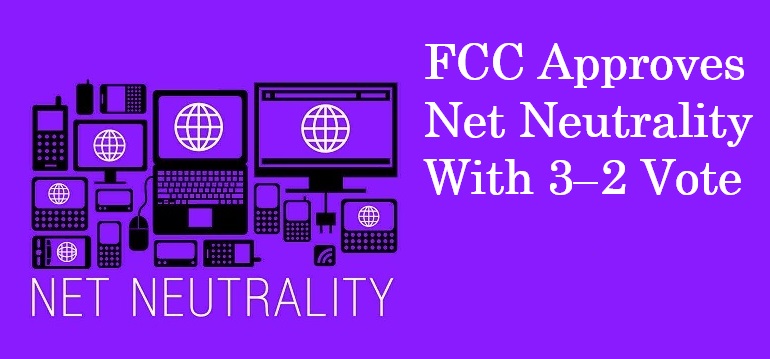
February 26, 2015 shall go down in history as a landmark event for the preservation of freedom on the internet. Or that's the hope, at least.
- Democrats
- Tom Wheeler, the Chariman: A former entrepeneur and telecommunications policy expert, advocate and businessman. Prior to joining the FCC, he was Managing Director at internet-oriented venture capital firm Core Capital Partners.
- Mignon Clyburn: She operated the family-owned Coastal Times newspaper as publisher and general manager before serving as a member of the Public Service Commisssion of South Carolina.
- Jessica Rosenworcel: A practioner of communications law who formerly served as Senior Communications Counsel for the United States Senate Committee on Commerce, Science, and Transprotation.

- Republicans
 Ajit Pai: He has worked in both the private and public sectors. For the former, he has worked as Associate General Counsel to Verizon. For the latter, he has served in all 3 branches of government, including a post as Senior Counsel in the Office of Legal Policy for the Department of Justice.
Ajit Pai: He has worked in both the private and public sectors. For the former, he has worked as Associate General Counsel to Verizon. For the latter, he has served in all 3 branches of government, including a post as Senior Counsel in the Office of Legal Policy for the Department of Justice.- Michael O' Rielly: A former Policy Advisor in the Office of the Senate Republican Whip from 2009 to 2010, and former Legislative
 Director for the Office of U.S. Senator John Sununu.
Director for the Office of U.S. Senator John Sununu.
Municipal Broadband
During the meeting, the Title II vote was treated as the main event. The warm-up match was a separate, but still important matter - determining if the FCC should prohibit state laws that ban municipal broadband
Cities are largely restricted from forming their own broadband networks as a result of large telecom companies lobbying to the states. About 20 states have instated a type of law to enforce these restrictions upon municipaltiies. The FCC was being asked to lift these restrictions in the name of promoting broadband competition and investment.
The Democratic commissioners were largely on board with the idea. Clyburn argued that cities and small communities were pigeon-holed into a "digital darkness" by these harsh state restrictions, so preempting them would be of great benefit.
The opposing conservative commissioners argued that the FCC does not have the legal authority to override state decisions. In a familiar battle throughout American history, it came down to federal law vs. state law and local law, and wherein the jurisdiction ultimately lies.
"The commission respects the important role of state governments in our system. We don't take lightly the matter of preempting state laws," Wheeler says of the situation.
When put to a vote, the decision was passed. The FCC would intervene upon states to preempt laws that ban municpal broadband, allowing cities to, as Wheeler put it, "make their own decision about their broadband future."
Title II and Net Neutrality
It was time for the big one. A bunch of important people were brought in to testify for Title II, including Tim Berners-Lee, also known as the inventor of the World Wide Web. "I didn't have to get permission from anybody," he said, "I didn't have to pay ISPs special fees, I didn't have to convince anybody that this new technology should be let through."
The Republican commissioners condemned the Title II plan, believing the forbearance measures would deteriorate and that it was all apart of a plan by Obama to regulate the internet. The implementation of Title II also does not stand on the most solid of legal fotting, once again calling into question if the FCC has the power to reclassify the internet.
The Democratic side threw their support behind Title II, citing the 4 million people who wrote into the FCC expressing their concerns about the internet's future.
Replying to the implication that Title II was a secret plan to regulate the internet, Wheeler called the notion sheer "nonsense!"
"We cannot have a two-tiered internet with fast lanes that speed the traffic of the privleged and leave the rest of us lagging behind," said Rosenworcel in a succint summary describing the need for net neutrality. "...we do not need blocking, throttling, and paid prioritization schemes that undermine the internet as we know it."
When put to the vote, Title II, and thus net neutrality, won at a score of 3-2.
The rules defending net neutrality should go into effect in a few months. In reality, it will be much longer than that, as the large ISPs are surely reeling from this defeat and lawyering up to take the FCC to court.
Sources: http://www.fcc.gov/document/chairman-wheeler-proposes-new-rules-protecting-open-internet
http://agbeat.com/tech-news/fcc-chairman-giving-net-neutrality-fight/
http://www.theverge.com/2015/2/26/8114265/fcc-ruling-net-neutrality-victory-internet-title-ii
